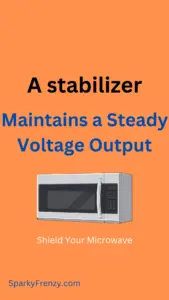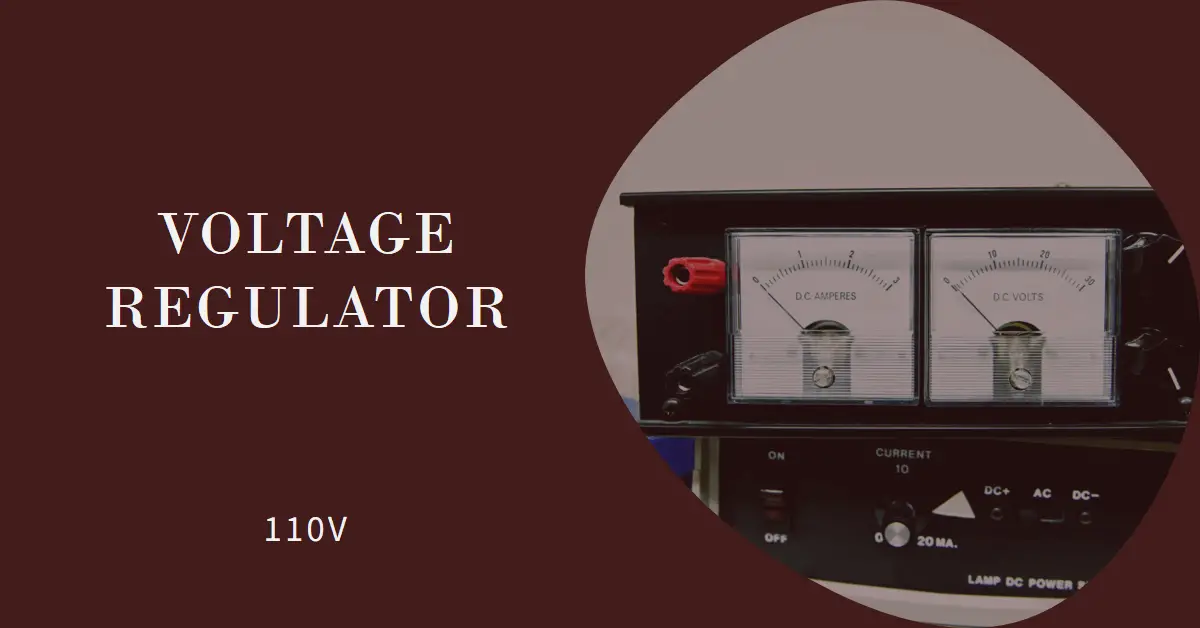Microwave ovens have become an indispensable part of modern kitchens, making meal preparation quick and convenient.
However, one often overlooked aspect is the impact of voltage fluctuations on these appliances. In the USA, voltage fluctuations can occur due to various reasons, and they can potentially harm sensitive electronic devices like microwaves.
To safeguard your valuable appliance, using a stabilizer might be a viable option. A stabilizer acts as a protective barrier between your microwave and the fluctuating electrical supply.
It stabilizes the voltage, ensuring a steady and safe level of power reaches the microwave, irrespective of the variations in the main power source.
In this article, we’ll explore the benefits, risks, and considerations of using stabilizers with microwaves.
Understanding Voltage Fluctuations
Voltage fluctuations are variations in the electrical supply that can cause the voltage level to go above or below the standard voltage.
The causes may include power grid issues, sudden changes in electricity consumption, or natural events like lightning strikes.
These fluctuations can have detrimental effects on the performance and lifespan of electronic appliances, including microwaves.
Read my comprehensive article: How Low Voltage Can Damage Your Appliances.
Stabilizers: An Introduction

A stabilizer is an electrical device designed to maintain a steady voltage output to connected devices, compensating for fluctuations and ensuring smooth operation.
Stabilizers come in various types, such as relay-type, servo-controlled, and static stabilizers, each offering specific features to protect electronic equipment from voltage irregularities.
Stabilizers for Microwave Ovens
Can I Use a Stabilizer for My Microwave?
Yes, you can use a stabilizer with your microwave to protect it from voltage fluctuations. Microwaves are sensitive to electrical variations, and a stabilizer acts as a barrier, preventing any harmful effects on the appliance.
Factors to Consider Before Using a Stabilizer with a Microwave
Before purchasing a stabilizer, consider the power rating and voltage range of your microwave. Choosing a stabilizer with an appropriate capacity and suitable voltage range ensures optimal protection and performance.
Recommended Stabilizer Specifications for Microwaves
For a typical countertop microwave, a stabilizer with a capacity of 1000-1500 Watts should suffice. However, it is essential to refer to the microwave‘s user manual or consult with the manufacturer for specific recommendations.
Advantages and Benefits
Protection against Voltage Fluctuations
The primary advantage of using a stabilizer is safeguarding your microwave from voltage irregularities.
By maintaining a constant voltage output, stabilizers prevent sudden power surges or drops, reducing the risk of damage to the appliance’s sensitive components.
Prolonging the Lifespan of the Microwave
With a stabilizer in place, the microwave’s internal circuitry and electronic parts are shielded from potential voltage-related wear and tear.
This protection can significantly extend the microwave‘s lifespan, saving you money on repairs or replacements.
Improved Microwave Performance
Stabilizers not only protect the microwave but also ensure consistent performance. By providing a stable power supply, the microwave can function optimally, leading to better cooking results and efficiency.
Potential Risks and Considerations
Compatibility Issues with Some Microwaves
While stabilizers are generally compatible with most microwaves, it’s essential to check for any brand or model-specific compatibility issues.
Some microwaves may have built-in voltage protection, rendering an external stabilizer unnecessary.
Incorrect Installation and Usage
Improper installation or misuse of stabilizers can lead to malfunctions and even cause damage to connected appliances.
It’s advisable to have a professional electrician install the stabilizer and follow the manufacturer’s guidelines for usage.
Warranty Implications
Using a stabilizer that is not recommended or not compatible with your microwave might void the appliance’s warranty. Ensure that the manufacturer approves the use of a stabilizer before making a purchase.
Selecting the Right Stabilizer for Your Microwave
Calculating the Power Rating Requirements
Calculate the power rating by summing up the wattage of all connected devices to the stabilizer. Ensure that the stabilizer’s capacity is equal to or higher than this calculated value to ensure effective protection.
Choosing the Suitable Stabilizer Type
Consider factors like response time, efficiency, and budget while choosing between relay-type, servo-controlled, or static stabilizers. Each type has its pros and cons, so make an informed decision based on your needs.
Brands and Models to Consider
Reputable stabilizer brands known for quality and reliability include APC, V-Guard, Tripp Lite, and CyberPower. Research customer reviews and expert recommendations to find a suitable model for your microwave.
I have performed the hard work for you! I recommend this stabilizer:
Installation and Maintenance
Professional Installation vs. DIY
For safety and optimal performance, it’s recommended to have a professional electrician install the stabilizer. DIY installations may lead to incorrect connections and potential hazards.
Safety Measures During Installation
Ensure that the stabilizer is installed in a well-ventilated area away from moisture and direct sunlight. Regularly check for loose connections and signs of damage to maintain the stabilizer’s effectiveness.
Frequently Asked Questions (FAQs)
Are Stabilizers Necessary for All Microwaves?
While stabilizers offer valuable protection, not all microwaves require them. Check the manufacturer’s guidelines and consider your location’s voltage stability before deciding.
Can I Use the Same Stabilizer for Other Appliances?
Stabilizers are versatile and can be used with various electronic devices that are susceptible to voltage fluctuations, such as refrigerators, air conditioners, and televisions.
How Do I Identify Voltage Fluctuations?
Keep an eye out for sudden dimming or brightening of lights, buzzing sounds from electronic devices, or unexpected power surges. Additionally, invest in a voltage stabilizer with an in-built voltage display for accurate monitoring.
Conclusion
Investing in a stabilizer for your microwave can be a wise decision to protect your appliance from voltage fluctuations and ensure its longevity.
By understanding the compatibility, installation, and maintenance aspects, you can make an informed choice to safeguard your valuable kitchen companion effectively.
Remember, safety always comes first, so opt for professional installation and adhere to the manufacturer’s guidelines for optimal results.



